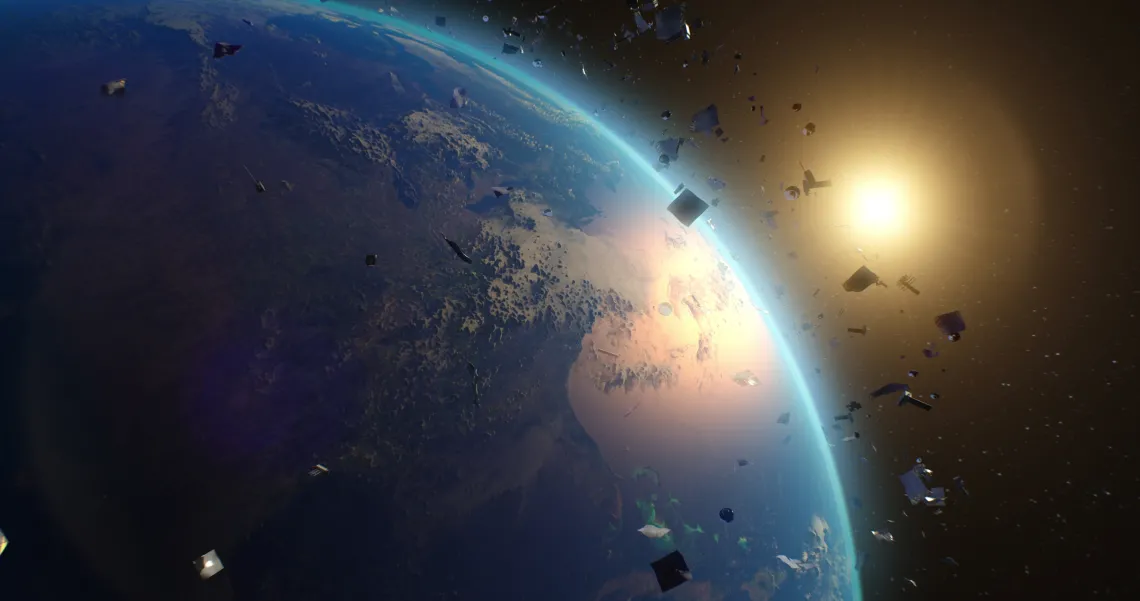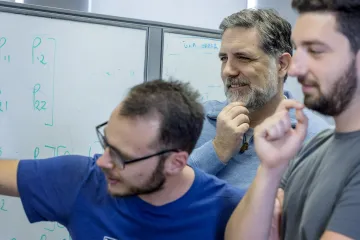UArizona’s Space4 Center Part of International AI Space Sustainability Project

The University of Arizona is part of an international collaboration that is exploring how artificial intelligence can be harnessed to improve space operations, safety and sustainability.
Roberto Furfaro, professor of systems and industrial engineering and deputy director of the Space4 Center, is the UArizona co-principal investigator in the £1.5million initiative—approximately $1.9 million based on the current exchange rate.
The project will accelerate the development of artificial intelligence, or AI, technologies from concept, at early technology readiness levels, to adoption in the space sector. The partnership will also pave the way for the creation of a new virtual Institute on AI for Space Safety & Sustainability aimed at attracting additional funding for further work.
“Our primary objective is to create dependable AI systems capable of managing the inherent uncertainties of space, which have very real policy, insurance and safety implications,” Furfaro said. “The international team will develop AI solutions for analyzing space object behaviors, automating operations, and ensuring the long-term preservation of space.”

Professor Roberto Furfaro in his lab with postdoctoral associates Andrea D'Ambrosio and Lorenzo Federici.
The University of Strathclyde’s Aerospace Centre for Excellence in Scotland is leading the project. Other partners include researchers from Massachusetts Institute of Technology; the University of Waterloo in Canada; the United Kingdom-based The Alan Turing Institute and commercial space companies LMO and GMV; Nominal Systems in Australia; and Columbiad in Canada.
By processing vast amounts of data, AI can help predict and avoid collisions with space debris—defunct man-made objects—and predict space weather events, ensuring the secure operation of space assets such as satellites.
“AI’s ability to make autonomous decisions in real-time is crucial for maintaining the sustainability and security of space operations amid the growing complexity of the space environment,” Furfaro said. “The students and postdoctoral fellows funded by the Space4 Center will be instrumental in data collection and analysis for creating sophisticated AI models for spacecraft protection.”
The Space4 Center is developing research and education solutions to ensure that use of orbital space remains safe, secure and sustainable for decades to come.
Space around the Earth is becoming increasingly congested with both active satellites and space debris like rocket bodies and smaller items, such as discarded astronaut’s toothbrushes and even flecks of paint. Each space mission leaves more debris, which could create hazardous conditions for astronauts and spacecraft in the future, or collisions that disrupt communications and other systems.
According to the U.S. Space Command, the amount of space debris has increased by 76% since 2019 to 44,600 objects.
What’s more, between 20,000 and 100,000 new satellites are forecast to be launched into space over the next decade, potentially creating a major traffic jam in space if not managed in a sustainable way, said Vishnu Reddy, Space4 Center director and professor of planetary sciences.
“The sustainability of the use of space is essential to enable any future space activity. The sector is based on a model that isn’t sustainable because we keep on launching materials into space, meaning there is a constant drain we take from Earth,” said project lead Massimiliano Vasile, director of the Aerospace Centre of Excellence at Strathclyde. “Eventually nothing will be able to use space and it will be so crowded you can’t launch anything.”
Vasile said the collaboration will demonstrate different uses of AI, including the behavioral analysis of space objects: Understanding what we are looking at when we observe the sky, what the object is and what it is doing.
The year-long AI project comes under the second phase of £20 million International Bilateral Fund investments by the UK Space Agency, which will help UK organizations link up with global experts. Phase 1 of the project focused on establishing a clear vision to fast-track the advancement of AI technologies that are critical for space operations.

